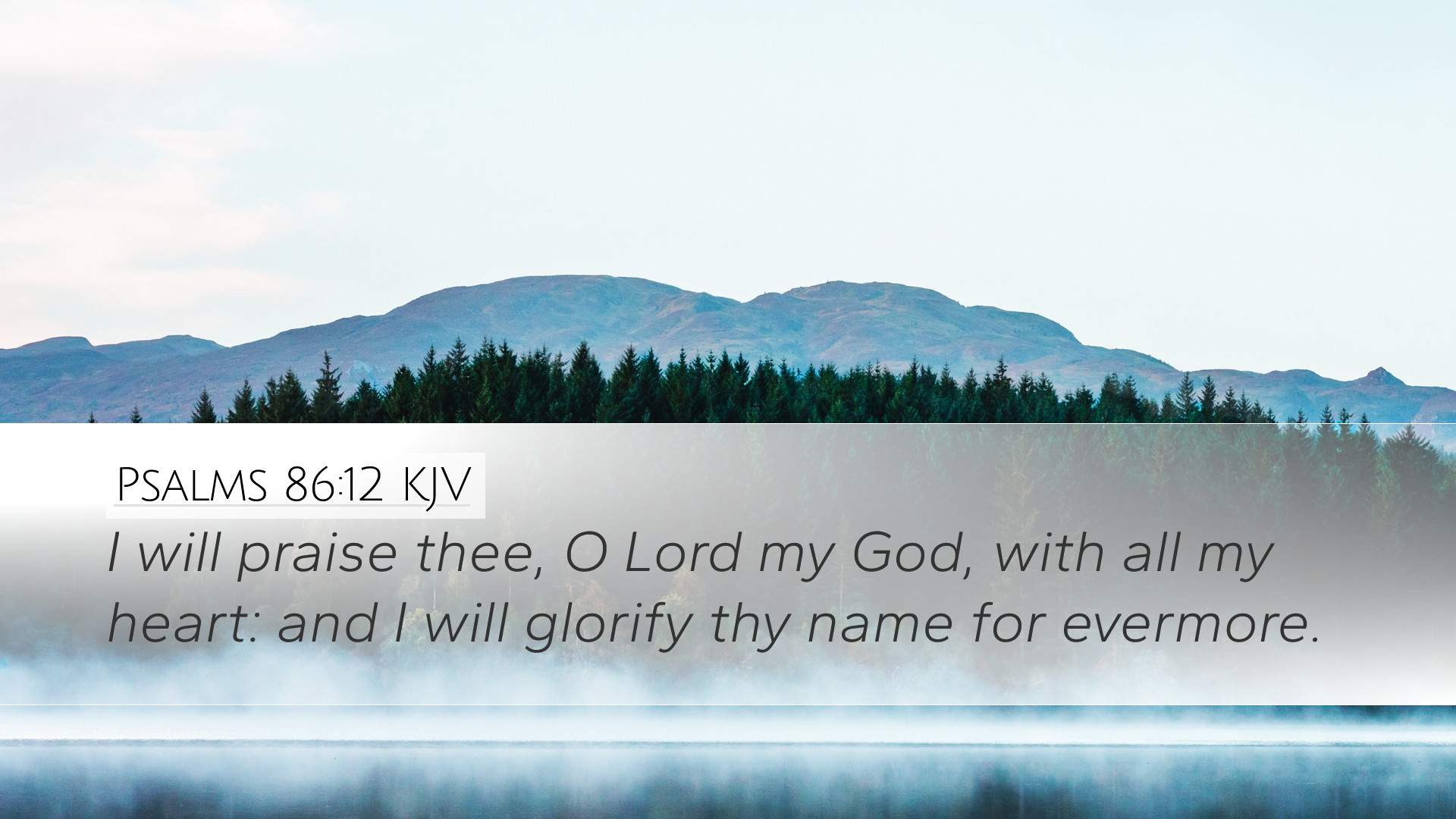Psalms 86:12 Commentary
Bible Verse: "I will praise thee, O Lord my God, with all my heart: and I will glorify thy name for evermore."
Context and Structure
The Psalms are a collection of songs, prayers, and meditations that express the full range of human emotion towards God. Psalm 86 is a prayer of David that encapsulates deep personal distress yet also emphasizes unwavering faith and devotion. The chapter is characterized by David's earnest plea for God's mercy and assistance, as well as his overwhelming desire to honor the Lord. Verse 12 serves as a pivotal declaration of worship and commitment that resonates throughout the Psalm.
Insights from Public Domain Commentaries
Matthew Henry's Commentary
Matthew Henry reflects upon the heartfelt nature of this expression of praise. He writes that the phrase "with all my heart" suggests an intensity and sincerity in David's commitment to worship. This is not a half-hearted or superficial praise; rather, it arises from deeply rooted gratitude and reverence for God's attributes. Henry emphasizes that the act of glorifying God demands all of one's faculties—mind, soul, and strength—further indicating that worship should be holistic and encompassing.
Albert Barnes' Notes on the Bible
Barnes focuses on the personal relationship depicted in the Psalm. When David says he will glorify God "for evermore," it implies a commitment that is timeless and eternal. This points to the nature of divine praise that transcends present circumstances. Barnes also comments on the importance of corporate worship and how David’s personal commitment serves as an example for communal praise among the people of God. He highlights that such a declaration encourages believers to unite in glorifying God's name in all their pursuits.
Adam Clarke's Commentary
Clarke delves into the significance of praising God. He suggests that David's proclamation embodies not merely acknowledgement of God's great deeds but also a commitment to vocalizing his appreciation. Clarke interprets "I will glorify thy name" as an active declaration of God's holiness and nature. He further notes that the practice of glorifying God in one's life can take many forms, including obedience to His will, acts of kindness, and sharing God's love with others. Clarke also emphasizes the 'evermore' aspect, which suggests that the worship of God should be a continual process, reflecting a lifestyle of devoted service.
Theological Implications
This verse holds significant theological implications regarding the nature of worship and the relationship between the believer and God. It underscores the essence of worship as being both a response to God's love and a commitment to recognize His sovereignty.
- Holistic Worship: Worship involves the entirety of the believer's being. It is not confined to external acts but stems from a deep internal conviction and affection for God.
- Enduring Praise: The notion of praising 'for evermore' highlights eternity's significance in the life of faith. It suggests that worship is not limited to liturgical settings but continues throughout life and into eternity.
- Public and Private Praise: Following the example of David, believers are encouraged to both publicly and privately glorify God, reflecting a well-rounded approach to worship.
Practical Applications
For pastors, theologians, and students, Psalms 86:12 serves as a reminder of the core principles of worship and service in the Christian life:
- Intentionality in Worship: It challenges leaders to foster environments that encourage full-hearted praise, whether in congregational settings or individual practices.
- Integration of worship in daily life: Individuals are called to express their worship through their actions and interactions with others, making every moment a potential act of glorifying God.
- Enduring Faith: The commitment to praise God forever can inspire believers to develop perseverance in faith, especially during trials.
Conclusion
In conclusion, Psalms 86:12 encapsulates the attitude and essence of true worship—one that is heartfelt, committed, and perpetual. Engaging with the insights of Matthew Henry, Albert Barnes, and Adam Clarke opens deeper understandings of its implications for personal faith and communal worship. This declaration by David serves as an enduring call to the church to continually glorify God's name with all that they are, both now and forevermore.


